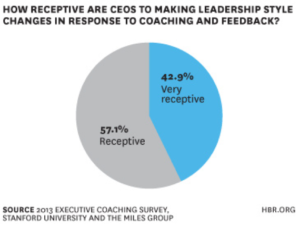
The short answer to ‘why’ CEOs should leverage executive coaching is simple: it is the clearest way to develop leadership skills, to take a leader with potential and help to make them extraordinary. Also? It’s lonely at the top. Few people will tell you where you are going wrong and even fewer will support you through developing skills to change that path.
Or put another way: “Dare to cross the bridge between the leader you are and the leader you have the potential to be.” Sound familiar? It’s a tagline we favor because it’s true.
“Two-thirds of CEOs don’t receive any outside advice on their leadership skills, and yet almost all would be receptive to suggestions from a coach.”
This from a Stanford University/The Miles Group survey of 200 CEOs. What’s interesting about the information gathered in the survey isn’t so much why the CEOs need coaching, but how interested they were in it and how they leveraged it.
Let’s go back a step, and look at the WHY:
Why CEOs need to leverage executive coaching
“Given how vitally important it is for the CEO to be getting the best possible counsel, independent of their board, in order to maintain the health of the corporation, it’s concerning that so many of them are ‘going it alone,’” says Stephen Miles, CEO of The Miles Group. “Even the best-of-the-best CEOs have their blind spots and can dramatically improve their performance with an outside perspective weighing in.” (Source)
Executive coaching helps leaders to:
- Gain clarity on their goals and achieve them, with strategic thinking;
- Become more self-aware, with a strong and authentic style;
- Develop strength, resilience and presence.
There are four key areas where executive coaching can really make a difference:
1. Communication is at the top
This isn’t just about making speeches and getting people to do what you want them to do. Executive coaching helps individuals to dig deep on their understanding of communication, including developing active listening skills, nonverbal cues, credibility, respect and authority in speech.
2. Perception is reality
If you learn how people perceive you and how to expand upon the ways in which they do so positively, you can take those perceptions and grow your presence.
3. Leadership style that works for you
Often leaders don’t realize that their leadership style can actually be inhibiting them, and their team, from growing. For example, leaders who tend to over-manage their team won’t be getting the best performance that they would get if they learned to step back and allow people to do what they do best. Executive coaching helps to hone in on the traits that could be holding you back.
4. Develop your EI—emotional intelligence
More important that IQ, your EI is the basis of how you relate to others. If you’re in tune with how people—including yourself—use emotion, how you/they react in different situations and where you can be helpful to manage these within the working relationship, you’re way ahead!
Now let’s take a look a closer look at the survey results to understand the HOW:
How CEOs leverage executive coaching
Most leaders who have reached the C-suite are aware of any shortcomings they might have in terms of leadership skills. For many, the ascent to the top had a lot to do with technical ability in their particular industry or business, and less to do with the inherent skills that good leadership requires.
In fact, according to the survey: “78% of CEOs said it was their idea to receive coaching.” (Source) This despite a sense among some organizations and their boards of directors that seeking coaching is a sign of weakness in the C-suite. In reality, it’s anything but.
“In general, where there is a relationship between coaching and getting to the top is when an executive believes in continuous learning and development.” (Source)

(Source)
And when CEOs did look for coaching, they were usually looking for very specific skills development including, in the top 3:
- Conflict management – 42.9%
- Listening skills – 32.1%
- Sharing leadership / delegations skills – 35.7%
Another important point is that getting executive coaching from a source outside of the organization is optimal. Like anyone looking at their own work, it’s difficult to be objective. By bringing in a coach from outside the existing organizational structure, the CEO is guaranteed to find out about areas of need that they might not even have realized they needed to look at. Furthermore, they can be guaranteed a ‘safe place’ to work through issues of self-awareness, growth and understanding of their role.
It’s clear WHY executive coaching is important for those ascending to newer and higher roles, and HOW executives have been shown to leverage it proves that they gain a tremendous amount of self-awareness and understanding of their goals, styles and abilities, with a view to improving all of them, to help them to explore all of their potential.

Take the quiz:
What's your generosity quotient?
To become a groundbreaking leader, you need to know where you stand. Discover your default generosity style with our free assessment.



